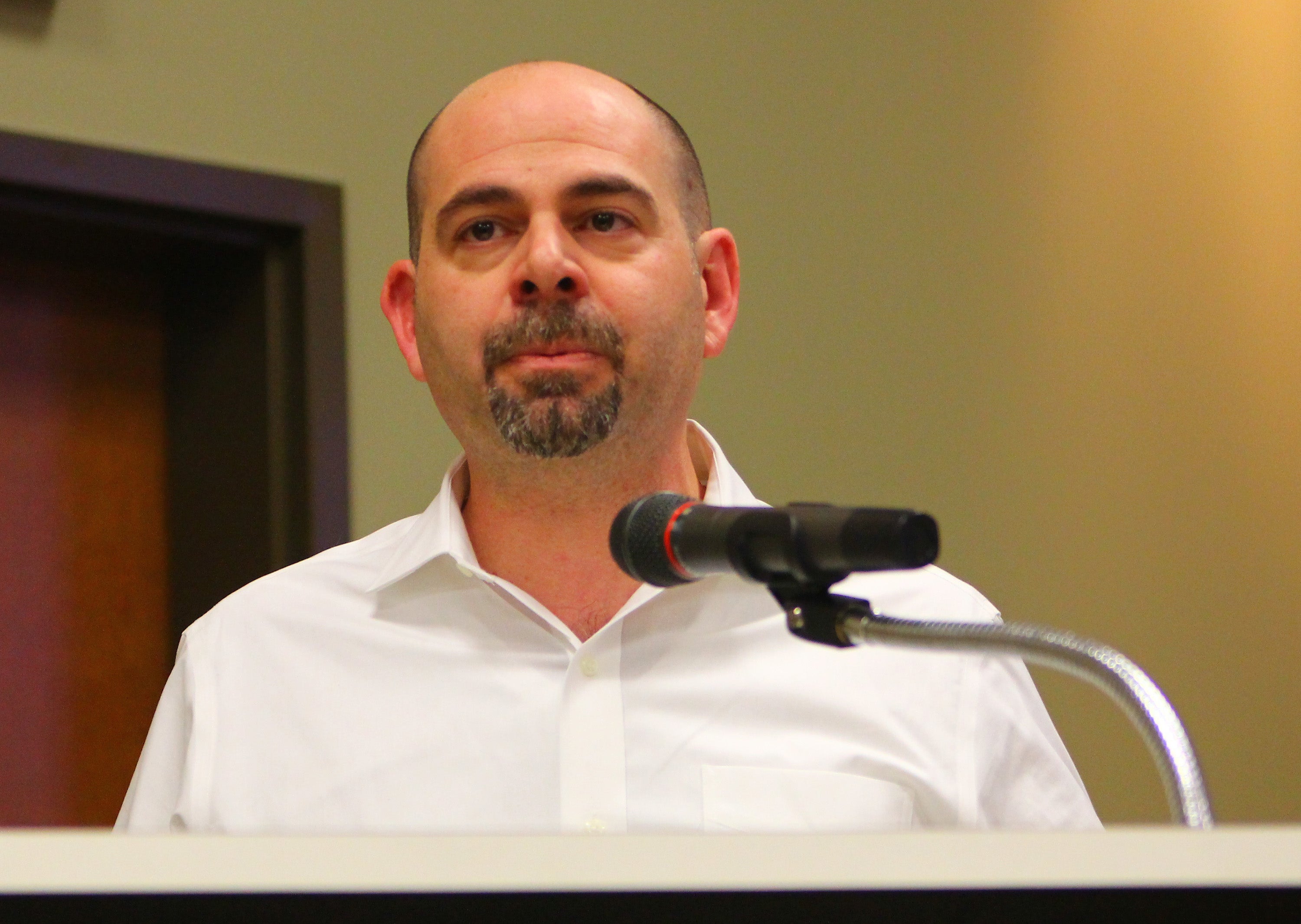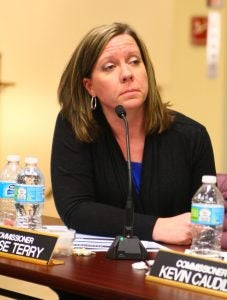RKG delivers huge ‘menu’ of economic development options
Published 3:48 pm Friday, March 17, 2017

- (Photo by Ben Kleppinger/ben.kleppinger@amnws.com) Kyle Talente with RKG and Associates speaks during Thursday night’s meeting at Danville City Hall.
Editor’s note: This is the first of several stories coming out of the most recent meeting of local economic development partners as they work to develop a strategic economic development plan for Boyle County.
Boyle County leaders were given a “menu” of economic development options Thursday night, but there were no prices available yet.
“This is the full menu and at the end of this, when you are done and we say, ‘OK, we’ve established this is where we want to go,’ you will then pick and choose from that menu the business plan based on how much you’re willing or how much you’re ready to invest in economic development,” said Kyle Talente, the consultant guiding the effort to create a long-term economic development strategic plan.
Talente presented his list of all the different ways the Danville-Boyle County Economic Development Partnership members could attempt to spur on the local economy and then took questions from local officials and citizens in a nearly two-hour session Thursday night that served as special called working sessions for Danville City Commission and the Boyle County Fiscal Court.
Talente listed 49 different topics within six major areas where leaders could either implement new economic development strategies or improve on current ones. Dozens more smaller options were listed under the topics.
Talente compared the entirety of his “menu” to being “champagne and steak.” Given the cost likely associated with doing everything, it’s likely leaders could want to start out more modestly with “burgers and beer.”
“All that we talk about here tonight is not necessarily stuff that we’re going to start doing tomorrow,” he said. “But it’s stuff that we need to do if we want to reach all our goals at some point in time.”
Some of the options include:
• constructing a spec building that could be sold or leased to a new business as soon as the business is ready to open;
• clearly delineating the different roles of different EDP members so there is less confusion about who is doing what;
• increasing community involvement in economic development from existing businesses, retirees and people who want to see the local economy improve;
• acquiring development rights for the land currently used by the Kentucky School for the Deaf; and
• publishing land prices and business incentives for anyone to see so that site selection companies are more likely to look at Danville and Boyle County.
Spec building
Talente said a spec building is one way the local communities can improve the attractiveness of the area to prospective businesses. Such a plan is inherently risky, but developing a public-private partnership to construct and sell or lease the building is one way to minimize the risk.
“If everybody puts their piece of the pie in, when you sell the building or you lease the building at the back end, what happens is the investor gets their money back, the bank gets their money back and the community recoups some or all of the money that they put in,” Talente said. “The trade-off is if we don’t get our full investment back, we’ve created jobs that creates real property investment, which turns into taxes, we’ve created payroll, which turns into taxes, and we enhance the quality of life for our community by bringing more jobs in.”
“Now, obviously this is not something that you just do on a whim,” he continued. “You have to look at the deal and make sure it makes sense to us from a strategic perspective.”
Talente said a spec building could be a real “opportunity.”
“When I researched employment changes for Boyle County as well as for our surrounding neighbors, our communities that saw job growth particularly in the manufacturing and industrial sector are ones that are investing in spec buildings,” he said. “To me, that is a direct correlation between if we want that number to grow and not just stay the same or even shrink, we have to be in the game. It is an ugly truth in economic development that incentives are a real part of the deal. I don’t believe this is news to anybody sitting in this room. … This is a way through a public-private partnership to minimize our risk, to maximize our gain.”
Talente suggested beginning with a single spec building, as well as possibly making several other pieces of land “pad ready,” meaning if a business doesn’t want the pre-constructed building, it would still have several other options where the land has already been leveled and utilities are already run.

(Photo by Ben Kleppinger/ben.kleppinger@amnews.com)
City Commissioner Denise Terry asks a question of Kyle Talente during the meeting Thursday night.
Danville Commissioner Denise Terry asked Talente later in the meeting to run through an rough explanation of how a spec building process might play out. Talente laid out a progression:
• Leaders could find an organization, such as the Industrial Foundation, that has land that can be used, as well as a bank to finance construction and a private investor who’s interested in making a return on their investment.
• With 50-60 percent of the cost financed through a bank, the building could be constructed, with public entities such as county or city governments covering the costs of infrastructure like utilities and roads.
• Once the building is there, it becomes a waiting game for a business that wants it. The best scenario is one where a business wants the building even before it’s completed; the partners could also wait months or years.
• When a business picks the building, it could be sold for just enough to pay back the bank and the investors, but not enough to pay back the public entities. That could be a good idea if the tax revenues from landing the business are going to outweigh the public’s investment.
• It’s also possible to lease the building and pay back the bank and investors over time. This can be trickier and is more of a “long-term” strategy, but if successful, once the bank and investors are paid off, the public entities would own the building outright and could continue leasing or sell it.
Magistrate John Caywood said construction of a spec building has been a topic of conversation for a long time.
“I think you’ve got to have some community buy-in” to move forward with a spec building project, Caywood said, adding he doesn’t think that buy-in exists “at the present time.”
Talente said Caywood’s comments go back to “how entrepreneurial” the community wants to be. There’s definite risk — some communities have had spec buildings on the market for “five, eight, 10 years,” he said. But the communities that are seeing growth in jobs are the ones taking risks like spec buildings, he reiterated.
“So it’s a simple decision,” Mayor Mike Perros said. “Are we going to get in the game?”
READ MORE
Read tomorrow’s paper to learn about Talente’s suggestions for restructuring or redefining the roles of the partner agencies in the EDP.






